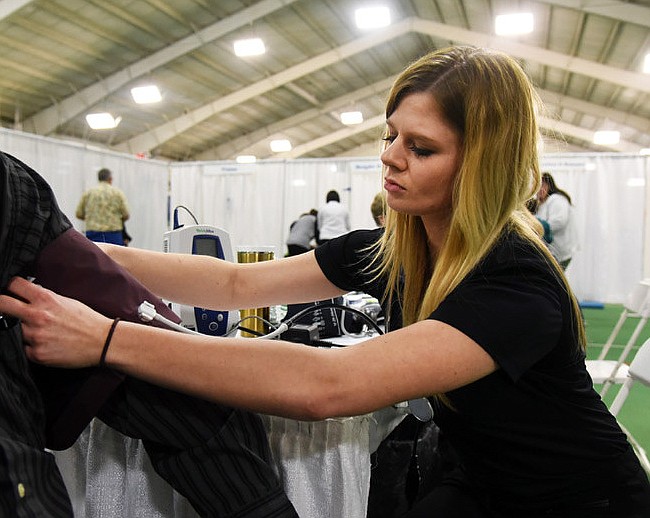[<a href="https://www.newstribune.com/news/health/" style="color:#33AEFF">access the News Tribune Health section</a>]
Health officials warn that elderly people with underlying health conditions, such as hypertension, have increased risk of severe illness or death from the new coronavirus.
Early data from China, published in February, also show patients who died from the disease suffered "substantial cardiac damage," according to an American Heart Association news release.
It's most important for cardiovascular patients to know they are at higher risk, according to Mozow Zuidema, vice chair of medicine at Boone Hospital in Columbia. Zuidema, a cardiologist who regularly treats patients at Jefferson City Medical Group, said her colleagues are trying to reach out to patients to get them as stable as possible before the worst of the pandemic happens.
"We need them to be the most vigilant to avoid being infected," Zuidema said. "If they get infected, we need them to get treatment as soon as possible."
The risk of getting the disease is increasing as the pandemic spreads, according to the AHA release.
"For heart patients, prevention is the key," it said.
Although people with heart disease or other underlying conditions aren't at higher risk of contracting the disease, if they do get it, the chances of complications increase greatly.
"Others facing this higher risk include people 60 and over, pregnant women, young children, people with serious chronic lung and kidney conditions, and people with compromised immune systems," according to the release. "Stroke survivors may also have higher risk of complications."
COVID-19's spread can be slowed by preventing people from being exposed to crowds. It is spread mostly through the respiratory droplets produced when an infected person coughs or sneezes. The droplets can land in mouths or noses of people who are nearby or be inhaled into the lungs.
People also must maintain healthy habits at home, like washing their hands for 20 seconds with hot water and soap and staying home when they feel sick.
"Don't disregard your physical activity and healthy eating habits. These are foundation to maintaining and improving your health," the release states.
Even for people who don't have cardiovascular disease to start with, one of the complications from COVID-19 is that the virus may cause myocarditis - an inflammation of the heart muscle, Zuidema said.
"Patients are presenting with heart attack as well as inflammation of the heart muscle, as well as irregular heart rhythm," she said.
There are certain markers for myocarditis in the blood that physicians can test for, she said. Patients undergoing treatment for COVID-19 have those markers.
It raises questions.
"Is it a problem with the heart vessel having blockage? Or has it to do with the inflammation from the virus attacking the heart muscle?" Zuidema said.
Data have long shown that acute coronary events and strokes could be triggered by common infections, including respiratory and urinary tract infections, according to an AHA report.
"Influenza in particular is associated with increased risk, and some clinical trials provide additional evidence that influenza vaccination decreases cardiovascular risk (from the flu)," it said. "The AHA and the American College of Cardiology have recommended that patients with cardiovascular disease receive influenza vaccination to prevent flu-related respiratory disease and other complications, including cardiovascular events."
So it's reasonable to assume there is increased risk of cardiovascular events after infection by COVID-19.
Most people who get sick with COVID-19 will have mild to moderate symptoms and should recover at home. About one in seven patients develops difficulty breathing or other severe symptoms because of the virus. It can cause respiratory system failures and sometimes septic shock (a significant drop in blood pressure leading to heart failure, stroke, organ failure or death), according to a report from the World Health Organization.
Every day, physicians receive new data on the virus and its effects on people, Zuidema said.
"It's a whole new world," she said. "We have initiated telemedicine this week. We're trying to phase in some alternative ways to care for our patients."
Response to the pandemic is in a mitigation phase, where non-pharmaceutical interventions (like social distancing) are being used to help slow the transmission of the disease, the AHA report says.
"During the mitigation phase, it is crucial that public health agencies, hospitals, health care systems and others focused on the public's health learn from missteps early on, and subsequent successful mitigation in China," the report says. "We need to anticipate what's to come. It is increasingly likely that critical care physicians, cardiologists and cardiovascular clinicians will be called on to assist in the care of persons with COVID-19 who have underlying cardiovascular disease or who develop cardiac complications."
The AHA will be called on to disseminate information to patients, caregivers and families.
Social determinants of health - like education, income and access to care - will affect outcomes for severe, acute illnesses, the report said.
Regions with fewer resources are likely to face higher mortality and morbidity than areas with greater access to care, especially when increasing numbers of cases overwhelm health care systems - as they have done in parts of Italy.

